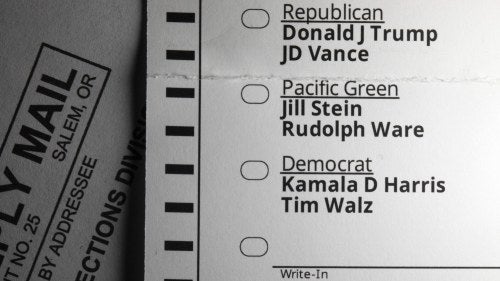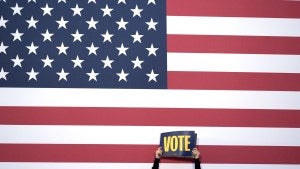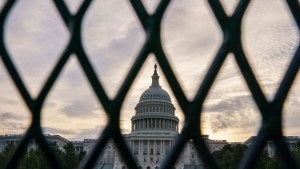What's Worrying US Foreign Policy Leaders Ahead of the 2024 Election

A recent survey offers a look at how experts think a Trump or Harris victory will impact US foreign policy moving forward.
The 2024 US presidential election could prove hugely consequential for US foreign policy and democracy at home. With great power competition resurgent, there are major questions about how a President Donald Trump or President Kamala Harris would deal with China’s rise, whether the United States will continue to support Taiwan, how the next administration will deal with Russia’s ongoing war with Ukraine, and how the country will relate to the NATO alliance. At home, the country’s democratic processes are also under intense pressure with the upcoming election, particularly since the last election yielded violent protests at the Capitol on January 6, 2021. It is an open question whether the country’s electoral institutions are up to the task.
A recent survey of 471 foreign policy leaders provides important insights on these issues. A majority of respondents—including experts from across the political spectrum—believe that a Trump victory would make a US withdrawal from NATO more likely, but war with Russia less likely. Democrats and Independents also believe a Trump victory would make it more likely the United States would abandon Taiwan, while Republicans think a Harris victory would make that prospect more likely. Democrats and Independents also think regardless of the outcome of the presidential election that political violence at home would become more likely.
For more than a decade, the Chicago Council on Global Affairs and the University of Texas at Austin have jointly conducted surveys of foreign policy leaders, including members of the executive branch, congressional staff, think tanks, businesspeople, academics, NGOs, religious groups, and labor organizations.
We asked about leaders’ expectations for what might happen if Donald Trump were to win and if Kamala Harris were to win. We also asked them whether either candidate winning would have an impact on the likelihood of five key possible outcomes, including war with China over Taiwan, the United States abandoning Taiwan, the United States leaving NATO, the United States going to war with Russia over Ukraine, and political violence in the United States around the election.
Notable among our findings about a possible Trump victory is that a majority of Republicans (56%), Democrats (95%), and Independents (78%) all agree that a Trump victory would make NATO withdrawal more likely. A majority also all agree that a Harris victory would make NATO withdrawal less likely (Republicans 71%, Democrats 87%, and Independents 79%). Withdrawal from NATO would be a monumental shift if that were to occur, a potentially transformational development with respect to US relations with Europe and America’s most important military alliance. At the same time, leaders of all partisan stripes agree that a Trump win would make war with Russia over Ukraine less likely (Republicans 84%, Democrats 76%, Independents 83%).
For other questions, the survey results showed stronger splits within political parties over the likelihood of war with China under a Trump or Harris presidency. A large majority of Democrats (92%) and Independents (64%) are convinced the United States would more likely abandon Taiwan if Trump were to win. Only 34% of Republicans think that a Trump win would make US abandonment of Taiwan more likely, but 52% of Republicans think a Harris victory would increase the likelihood of US abandonment of Taiwan.
“If foreign policy leaders are right, this election could be historic in important ways, leading to major shifts in the foreign policy orientation of the country.”
In terms of political violence, a high percentage believe political violence at home will be more likely, regardless of the outcome of the US presidential election (67% of all elites if Trump wins and 53% if Harris wins). That includes 45% of Republicans if Trump wins and 46% of Democrats if Harris wins.
When asked to explain their answers, the main reason offered by half of the respondents who gave reasons was that Trump and his supporters would be responsible, potentially going after opponents in the event of a victory or carrying out another January 6 response in the event of a loss. Those perspectives are especially pronounced among Democrats and Independents.
If foreign policy leaders are right, this election could be historic in important ways, leading to major shifts in the foreign policy orientation of the country, principally with respect to NATO and US relations with Russia. The leaders also express the view that political violence could increase, no matter who wins. These findings suggest a need for vigilance by law enforcement to guard against any election-related violence. More importantly, political parties and the media should reinforce expectations that elections and the transition between administrations should be peaceful.
Table 1. What Happens if Trump Wins
| Overall | Republican | Democrat | Independent | |
|---|---|---|---|---|
| More likely (%) | 26 | 20 | 26 | 27 |
| Less likely (%) | 47 | 67 | 42 | 48 |
| Overall | Republican | Democrat | Independent | |
|---|---|---|---|---|
| More likely (%) | 75 | 34 | 92 | 64 |
| Less likely (%) | 15 | 43 | 4 | 23 |
| Overall | Republican | Democrat | Independent | |
|---|---|---|---|---|
| More likely (%) | 84 | 56 | 94 | 78 |
| Less likely (%) | 6 | 19 | 0 | 9 |
| Overall | Republican | Democrat | Independent | |
|---|---|---|---|---|
| More likely (%) | 7 | 3 | 8 | 7 |
| Less likely (%) | 80 | 84 | 76 | 83 |
| Overall | Republican | Democrat | Independent | |
|---|---|---|---|---|
| More likely (%) | 67 | 45 | 75 | 63 |
| Less likely (%) | 15 | 23 | 14 | 14 |
Table 2. What Happens if Harris Wins
| Overall | Republican | Democrat | Independent | |
|---|---|---|---|---|
| More likely (%) | 13 | 35 | 8 | 14 |
| Less likely (%) | 35 | 30 | 35 | 37 |
| Overall | Republican | Democrat | Independent | |
|---|---|---|---|---|
| More likely (%) | 15 | 52 | 5 | 19 |
| Less likely (%) | 61 | 28 | 75 | 51 |
| Overall | Republican | Democrat | Independent | |
|---|---|---|---|---|
| More likely (%) | 3 | 3 | 3 | 3 |
| Less likely (%) | 82 | 71 | 87 | 79 |
| Overall | Republican | Democrat | Independent | |
|---|---|---|---|---|
| More likely (%) | 25 | 36 | 19 | 30 |
| Less likely (%) | 25 | 17 | 25 | 27 |
| Overall | Republican | Democrat | Independent | |
|---|---|---|---|---|
| More likely (%) | 53 | 52 | 46 | 65 |
| Less likely (%) | 24 | 20 | 33 | 13 |
The survey was fielded August 7-October 3 among a sample of 471 foreign policy opinion leaders from different professional groups, including 32 congressional staff, 42 members of the executive branch, 82 think tank leaders, 113 academics, 22 journalists, and 180 interest group leaders (65 from NGOs, 88 from business, 15 from religious institutions, and 12 from labor unions). The sample is 53% Democratic, 12% Republican, and 34% Independents/Others. The results are presented with each group equally weighted in the results.






Related Content
 Public Opinion
Public Opinion
The 2024 Chicago Council Survey finds there is often less division than imagined when it comes to long-standing pillars of US foreign policy.
 Public Opinion
Public Opinion
Results and analysis of the Council's annual survey of American views on foreign policy.
